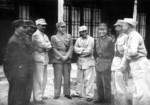Haydon Boatner
| Surname | Boatner |
| Given Name | Haydon |
| Born | 8 Oct 1900 |
| Died | 29 May 1977 |
| Country | United States |
| Category | Military-Ground |
| Gender | Male |
Contributor: C. Peter Chen
ww2dbaseHaydon LeMaire Boatner was born in New Orleans, Louisiana, United States in Oct 1900 to Mark Mayo Boatner, a graduate of Virginia Military Institute and an attorney and judge, and Byrd Elizabeth Boatner (née Bryant). He enlisted in the United States Marine Corps near the end of WW1, but did not participate in combat. Between 1919 and 1920, he attended Tulane University in New Orleans. In 1920, he received an appointment to the United States Military Academy at West Point, New York, United States. Upon graduation in 1924, he was assigned to the 29th Infantry Regiment based at Fort Benning, Georgia, United States. Between 1928 and 1930, he served with the 15th Infantry Regiment in Tianjin (Postal Map romanization: Tientsin), China. Between 1930 and 1934, he served as assistant military attaché at the US Embassy in China; during this time he learned to speak Mandarin. When WW2 broke out in Asia in 1937, he was recalled to the United States. He graduated from the Command and General Staff School in 1939.
ww2dbaseThe United States became a belligerent in WW2 in Dec 1941. In 1942, Colonel Boatner was made the commanding officer of American troops in Burma. Later in the same year, in Nov 1942, he was promoted to the rank of brigadier general. In 1943, he served as the chief of staff of the Chinese Army in Burma. Between 1943 and 1944, he was the commanding general of combat troops in northwest Burma. In Apr 1944, he was briefly placed in charge of the famed US 5307th Composite Unit (Provisional), "Merrill's Marauders", but was relieved by Brigadier General Theodore Wessels by 26 Jun 1944. Lieutenant Colonel George McGee, Jr., an experienced and well-respected Marauder battalion officer, considered this to be a good move as he considered Boatner to be difficult to communicate with and did not possess enough infantry command experience. Nevertheless, he remained in command positions until the end of the war.
ww2dbaseAfter the war, Boatner served as a professor of military science and tactics and commandant of cadets at Texas A&M University at College Station, Texas, United States. At the start of the Korean War in 1950, he served as the assistant division commander of the 2nd Infantry Division. In May 1952, he was made the commanding officers of the Geoje-do Prisoner of War Camp, which had long experienced violence between communist prisoners, anti-communist prisoners, and the guards but the situation had heightened by mid-1952. Boatner used deadly force against the most defiant compounds, including the use of tanks and flamethrowers, to put down the communist prisoners' uprising. At the rank of major general, he commanded the US 3rd Infantry Division between Dec 1954 and Oct 1955, and then served as the Provost Marshal General of the US Army between Nov 1957 and Oct 1960. He retired from military service in Nov 1960 and passed away in 1977. He was buried at the Arlington National Cemetery in Virginia, United States.
ww2dbaseHaydon Boatner had five siblings. His younger brother Bryant Boatner also served in the US Army during WW2.
ww2dbaseSources:
Gavin Mortimer, Merrill's Marauders
Wikipedia
Last Major Revision: May 2025
Haydon Boatner Interactive Map
Photographs
 |  |
Haydon Boatner Timeline
| 8 Oct 1900 | Haydon Boatner was born in New Orleans, Louisiana, United States. |
| 30 May 1944 | Brigadier General Haydon Boatner relieved John McCammon as the commanding officer of all American and Chinese units in the area of Myitkyina, Burma. |
| 2 Jun 1944 | Lieutenant Colonel George McGee, Jr. requested 2nd Battalion of US 5307th Composite Unit (Provisional) to be relieved and be evaluated from Myitkyina, Burma to India. Both Colonel Charles Hunter and Brigadier General Haydon Boatner agreed. |
| 3 Jun 1944 | The men of 2nd Battalion of US 5307th Composite Unit (Provisional), whom on the previous day received Brigadier General Haydon Boatner's approval to be evacuated to India for rest, began boarding aircraft at Myitkyina Airfield in northern Burma. |
| 26 Jun 1944 | Brigadier General Theodore Wessels relieved Haydon Boatner as the commanding officer of American and Chinese troops in the Myitkyina, Burma region. |
| 19 Nov 1957 | Haydon Boatner was named the Provost Marshal General of the US Army. |
| 31 Oct 1960 | Haydon Boatner stepped down as the Provost Marshal General of the US Army. |
| 29 May 1977 | Haydon Boatner passed away. |
Please consider supporting us on Patreon. Even $1 per month will go a long way! Thank you. Please help us spread the word: Stay updated with WW2DB: |

- » US State Lawmaker John Winter Caught Using Racial Slur "Jap" and Apologized (11 Jun 2025)
- » Köln/Cologne Evacuated After Discovery of WW2 Bombs (4 Jun 2025)
- » US Women's Army Corps "Six Triple Eight" Awarded with Congressional Gold Medal (30 Apr 2025)
- » Race, Holocaust, and African-American WW2 Histories Removed from the US Naval Academy Library (7 Apr 2025)
- » US Government Plans to Purge WW2 Information (17 Mar 2025)
- » See all news
- » 1,173 biographies
- » 337 events
- » 44,924 timeline entries
- » 1,245 ships
- » 350 aircraft models
- » 207 vehicle models
- » 376 weapon models
- » 123 historical documents
- » 261 facilities
- » 470 book reviews
- » 28,469 photos
- » 365 maps
Joachim von Ribbentrop, German Foreign Minister, Aug 1939